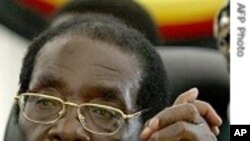Britain has vowed to block any attempts to re-engage Zimbabwe or let it rejoin the Commonwealth of Nations, saying President Robert Mugabe remains intransigent.
The Commonwealth Advisory Bureau, a London think tank, recommended this week that the Commonwealth at least re-engage Zimbabwe even if it didn’t seem likely to restore its membership when the nations gather in Perth, Australia, later this month.
Zimbabwe withdrew from the Commonwealth in 2003 after being suspended over Mr. Mugabe’s re-election in a 2002 ballot that many observers said was rigged.
David Howell, the British Foreign Office minister responsible for Commonwealth relations, told Reuters the Commonwealth should not soften its stance on Zimbabwe.
"Britain isn’t going to encourage olive branches or anything else to a Mr. Mugabe who is showing no sign of recanting, standing down or removing some of his ZANU thugs from the scene," Reuters quoted Howell as saying.
ZANU-PF sources have described Britain's stance as disappointing. Some in the party hoped that the current Conservative-Liberal government in London would be more willing than its Labor predecessor to re-engage the ZANU-PF side of the government.
Foreign affairs expert Clifford Mashiri said appeasing Mr. Mugabe would be a mistake, and that Britain and the international community should deal firmly with Mr. Mugabe.
Elsewhere, British Prime Minister David Cameron said the British government will slash aid to African countries which persecute members of the gay and lesbian community. Reports said Cameron expressed the hope other countries would follow his lead.
The policy was announced during a speech on the prime minister's plans to legalize gay marriage in Britain. Shifting to the international scene, he pushed for gay rights in African countries, saying he would combat violence and discrimination against homosexuals.
Britain reduce aid to Malawi by US$38 million after two men were sentenced to 14 years hard labor for getting engaged. Uganda and Ghana face similar penalties.
Zimbabwe, which received US$140 million in British aid last year, prohibits homosexuality under its 2006 Sexual Deviancy Act, which characterizes any act involving same sex contact such as holding hands, hugging or kissing as indecent and illegal.
Nonetheless, Chesterfield Samba, director of the Gays and Lesbians of Zimbabwe, said Cameron is misguided because cutting aid would be counterproductive.
Samba says that while homosexuality and human rights in Zimbabwe must be addressed, the British prime minister should not use such tactics to pressure for change. Instead, he said, advocates and policy makers must work to change views on homosexuality.





